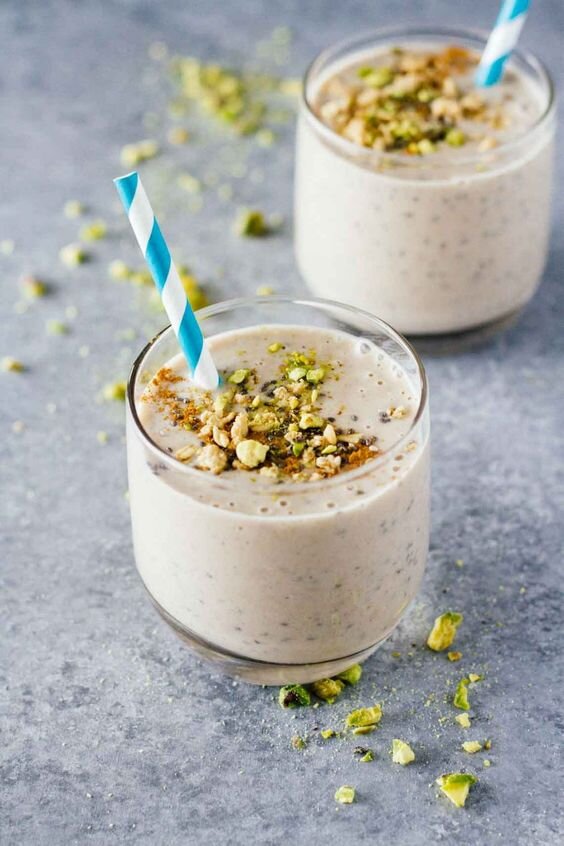Omega 3 Essential Fatty Acids on a Plant Based Diet
Hey guys, Elsa here. I have collaborated with a fellow dietitian, Millie, bring you guys some evidence based nutrition articles on some topics that I think are really important when it comes to nutrition. I hope you enjoy reading this first article!
Written by Millie Padula from Dietitian Edition
@dietitianedition www.dietitianedition.com
It is no secret that following a plant-based diet boasts an array of health benefits. After-all, there are upwards of thousands of research articles that promote the consumption of plant foods and plant-centric dietary patterns due to the positive effect these types of foods and nutrients can have on our brain & heart health, digestive function, inflammatory levels, mood and immunity. What’s not to love about that!
Whilst plant-based eating is all the rage (and for good reason at that – as you can see), we must still give careful consideration to certain nutrients that may be lacking in our diet due to the removal of animal products.
Throughout this blog, we are going to explore omega 3 essential fatty acids and take a closer look into why they are particularly important for individuals following a plant-based diet. Let’s get into it!
What are Omega 3 Essential Fatty Acids?
As the name suggests, Omega 3 Essential Fatty Acids are an essential type of dietary fat that we must consume through the variety of foods we eat every single day. The word ‘essential’ really just means that our body cannot produce any of this nutrient on its own, so we have to be mindful of the type and quantity of the foods we eat to ensure adequate intakes.
Omega 3’s are a type of polyunsaturated fat, which means they fall into the ‘unsaturated’ fat category. These are the type of fats that should be prioritised in our diet over ‘saturated’ varieties. Put simply - polyunsaturated fats -in particular Omega 3’s, are really the gold standard when it comes to fat – some would even say they are the ‘Gucci’ of the nutrition world.
Why? Well Research shows that including enough polyunsaturated fats in your diet can lead to overall improvements in heart health by regulating our heart rate/heart rhythm, lowering cholesterol and triglyceride (stored fat) levels and reducing blood pressure (1), all in collaboration with a healthy balanced diet of course!
Now that we’ve got the basics sorted, let’s get into the ‘sexy sciency stuff’:
Types of Omega 3 Fatty Acids
For the nature of this blog, the main thing I want you to understand is that there are two* types of Omega 3 Essential Fatty Acids:
1. Alpha-linolenic Acid (ALA) and,
2. Eicosapentaenoic Acid (EPA) and Docosahexaenoic Acid (DHA) which we will categorise together.
Given our (my) pronunciation efforts, I believe we will stick to acronyms for the rest of this blog – you can thank me later!
ALA is the leader, or the parent of the Omega 3 Fatty Acid family. This means that it is converted into our other Omega 3’s - EPA and DHA upon consumption. This won’t make much sense until we deep dive into the role of EPA and DHA (hang in there), but do keep in mind that the process of converting ALA to EPA and DHA is relatively weak and insufficient (2).
ALA is present in plant sources, such as:
- Flaxseeds/Linseeds
- Chia Seeds
- Walnuts
- Canola Oil
- Edamame
- Hemp Seeds
- Legumes (4)
DHA is actually the most important fat in the brain which means it is imperative to it its functioning given it serves as one of the main structural components (3).
EPA and DHA are also essential for:
- Neurological development
- Inflammatory levels
- Cardiovascular function
- Mood stabilisation
- Eye health (3)
EPA/DHA are found in marine sources such as salmon, herring, sardines, mackerel, trout, oysters and seas bass (4). Given that fish are unable to synthesise omega 3 naturally, they obtain this essential fatty acid via the consumption of micro algae (i.e seaweed). This means that micro algae eaten alone or in the form of a tablet, oil or powder makes for an excellent source of Omega 3’s for those following vegan and vegetarian diets (5).
Without supplementation, Individuals following plant-based diets rely heavily on getting enough EPA/DHA via the conversion from ALA, however based on what we mentioned before – is difficult due to the slowness of the process. In other words, our body doesn’t make as much as EPA/DHA from ALA as we would like. This is a lot to get your head around, so if you're still following along - well done!
What can those following plant-based diets do to ensure they are getting enough Omega 3’s every day?
Dietary
Unfortunately, there are no official dietary guidelines for how many milligrams of ALA should be consumed each day for plant-based eaters. Here in Australia however, the current recommendations from the National Health and Medical Research Council for Australian Adults are between 0.8-1.3g of ALA every day (5). With that in mind, research suggests that those following a plant-based diet should aim to consume double that amount every single day (aiming for approximately 2g/day) to account for optimal conversions to EPA/DHA (2).
Supplementation
Whilst most algae supplement manufacturers would suggest consuming between 200-300g per day, this may only be of benefit to individuals who are already consuming near adequate amounts of fat through their diet alone. Recent data has actually shown that supplementing between 1-2 grams (1000-2000mg) of algae oil per day - in split doses, can notably increase levels of DHA and EPA in the blood. Additionally, consuming algae in these concentrations may also assist in lowering stored fat levels (triglycerides), total body inflammation and blood pressure. (5)
If you find it difficult to tolerate tablets or oils, you can naturally increase your omega 3 consumption by including a tablespoon of spirulina or chlorella into your smoothies or raw treats. We promise that pairing these supplements with something sweet like fresh fruit will help to disguise the potent taste!
Before commencing a supplement or rapid change in dietary patterns, please do seek personalised guidance from a qualified health professional such as a Dietitian to ensure your diet is nutritionally adequate.
Practical strategies to increase your intake of Omega 3 Essential Fatty Acids (ALA) on a Plant Based Diet
Top your porridge with a healthy dose of flaxseeds
Add edamame beans to poke bowls and salads
Place a tsp of chia seeds into your smoothies Stir-fry or roast your vegetables in a drizzle of canola oil
Serve smashed avocado on soy & linseed bread
Add legumes into pasta sauces or experiment with home-made baked beans
For an added crunch and boost of healthy fats, add walnuts into your banana breads and muffins
Try hemp seeds! Add them into salads, smoothies and healthy treats
References/Sources:
1 – The Heart Foundation: Fats, Oils and Heart Health - healthhttps://www.heartfoundation.org.au/heart-health-education/fats-oils-and-heart-health
2 – The Medical Journal of Australia: Omega-3 Polyunsaturated Fatty Acids and Vegetarian Diets - https://www.mja.com.au/journal/2013/199/4/omega-3-polyunsaturated-fatty-acids-and-vegetarian-diets
3 – Frontiers in Ageing Neuroscience: Long-chain omega-3 fatty acids and the brain: a review of the independent and shared effects of EPA, DPA and DHA - https://www.ncbi.nlm.nih.gov/pmc/articles/PMC4404917/
4 – National Institutes of Health: Omega 3 Essential Fatty Acids – Health Professionals Fact Sheet - https://ods.od.nih.gov/factsheets/Omega3FattyAcids-HealthProfessional/#h10
5 – National Health and Medical Research Council: Nutrient Reference Values - https://www.nrv.gov.au/nutrients/fats-total-fat-fatty-acids
6 - Precision Nutrition: All About Algae Supplementshttps://www.precisionnutrition.com/all-about-algae
* two main types of Omega 3 Essential Fatty Acids are referred to for simplicity of the blog
Thanks for reading and we hope you find this blog post useful!
Ellie and Millie









